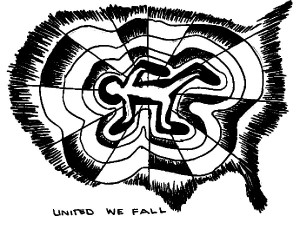Ferguson sheds light on campus racial profiling
National attention to the continued protests following the death of Michael Brown in Ferguson, Missouri has shed light on racial profiling here at USC. The widespread exposure the incident garnered encouraged many students to think more about the significant racial issues closer to home.
Just two days after Michael Brown’s death, the Los Angeles Police Department shot and killed Ezell Ford, a mentally ill black man wandering the streets of Florence in South Los Angeles — just over three miles away from USC’s campus. Though controversy about the specific circumstances of Ford’s death ensued, one thing was clear: Police brutality is a visible, terrifying threat for communities of color.
“It could be any one of us at any given time,” said executive director of the USC Black Student Assembly, Casey Ellis. “That’s why [Ferguson] didn’t come as a shock to anyone. No one was like, ‘Oh my gosh, how could this happen?’ It was more like, ‘Oh my gosh, how could this happen again for the umpteenth time this summer alone?’”
For the black community in Los Angeles and nationwide, the death of Michael Brown is only a reminder of the many gruesome possibilities that could follow a misunderstood reach to the pocket for a wallet or ID. Ferguson exploded not because the fate of Michael Brown is so shocking, but rather because it is so relatable — it is an amplified reminder of everyday race relations.
On campus, racial profiling remains a constant concern for the black community. According to Ellis, even Dept. of Public Safety Chief John Thomas has been stopped by Contemporary Services Corporation security officials and asked to show his ID.
“People don’t think that it happens, but if Chief Thomas is stopped, then it happens,” Ellis said. “I don’t think you can find one guy, in my constituency at least, who hasn’t been approached by a DPS officer or CSC patrol on campus and asked to show their ID even if it’s not after 9 p.m. They’re confronted with mistrust immediately because of their presence.”
The next question, then, is how the campus community can educate students about racial profiling and hold officials responsible — and eventually bridge the mistrust between citizens and authority figures present in many communities of people of color. Last summer, the Black Student Assembly addressed the issue by discussing possible procedures to properly train officers, who might have preconceived notions about the community they serve.
“For the most part the officers who patrol areas that are heavily black or heavily Latino are not black and Latino, so they don’t come from the area and may not understand the culture and may already come in with built-in prejudices,” Ellis said.
On a local level, community efforts have vast potential to reduce racial profiling. Policymakers, however, must be wary of solutions that conveniently overlook the conspicuous prejudice among local authority figures — including President Obama’s social program, “My Brother’s Keeper,”- which promotes education to curb crime and poverty. This issue is not about the danger of black men; it is about maintaining accountability of police who use intimidation tactics and abuse power.
For once, let’s hear that young black men will be recognized as humans instead of hooligans. Communities that teach young black adults that they must hide from the cops to survive don’t forge trust between civilians and the police force; they destroy it. When police intimidation is the main instrument of discipline, there will never exist a community in which people of color can truly depend on their law enforcement.
It’s time for USC to take a stand. University officials must back up endeavors to resolve the issue. USC must use its monetary and professional clout to encourage and support community efforts to create acceptance between black neighborhoods and the often white authority figures that patrol them. They should instill more officer education programs and encourage greater transparency within the LAPD. Together, USC and the community can create a mutual bond of trust, uniting local police and citizens alike.
For the first time, the community must say that Los Angeles’ Ezell Ford will be the last one and mean it. Let’s live up to our promise—so that Ferguson’s protesters will help someone do something. Let’s translate their sacrifices into action. And let’s make sure this will never happen again.



When black people stop committing crimes (particularly violent ones) at a much higher rate than other races, then they will stop being profiled. And not a day sooner!